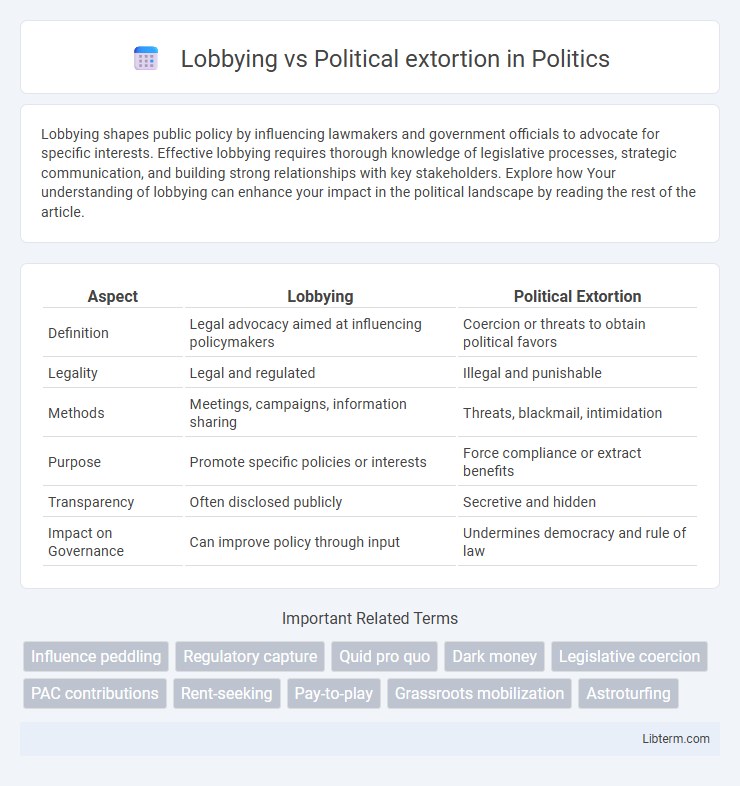Lobbying shapes public policy by influencing lawmakers and government officials to advocate for specific interests. Effective lobbying requires thorough knowledge of legislative processes, strategic communication, and building strong relationships with key stakeholders. Explore how Your understanding of lobbying can enhance your impact in the political landscape by reading the rest of the article.
Table of Comparison
| Aspect | Lobbying | Political Extortion |
|---|---|---|
| Definition | Legal advocacy aimed at influencing policymakers | Coercion or threats to obtain political favors |
| Legality | Legal and regulated | Illegal and punishable |
| Methods | Meetings, campaigns, information sharing | Threats, blackmail, intimidation |
| Purpose | Promote specific policies or interests | Force compliance or extract benefits |
| Transparency | Often disclosed publicly | Secretive and hidden |
| Impact on Governance | Can improve policy through input | Undermines democracy and rule of law |
Understanding Lobbying: Definitions and Core Principles
Lobbying involves advocacy by individuals or groups to influence political decisions through transparent communication and legal channels, aiming to represent specific interests or policy goals. It operates within regulatory frameworks that ensure accountability and prevent corruption while promoting democratic participation. Understanding lobbying requires recognizing its role in facilitating dialogue between stakeholders and policymakers, distinct from coercive tactics like political extortion.
What Constitutes Political Extortion?
Political extortion involves coercing public officials through threats, bribery, or illicit pressure to gain unauthorized advantages or policy changes. It is characterized by the abuse of power to extract personal or financial benefits in exchange for official acts. Unlike lobbying, which is a lawful attempt to influence government decisions, political extortion is illegal and undermines democratic principles by using intimidation or corruption.
Key Differences Between Lobbying and Political Extortion
Lobbying involves legally advocating for specific policies by influencing lawmakers through transparent communication and campaign contributions, whereas political extortion employs threats or coercion to obtain political favors or decisions. Lobbying operates within regulated frameworks ensuring accountability and disclosures, contrasting with political extortion's illegal and unethical tactics. Key differences include legitimacy, methods used, and legal consequences, with lobbying protected under free speech laws and extortion punishable by criminal law.
Historical Perspective: Evolution of Lobbying and Extortion
Lobbying traces its roots to early democratic societies where advocacy influenced policy through petitioning and negotiated dialogue, evolving into a formalized practice regulated by transparency laws. Political extortion emerged as a covert and coercive tactic historically used to manipulate decisions through threats or bribery, often condemned and criminalized by governments. The distinction between lobbying and extortion sharpened over time as legal frameworks developed to encourage legitimate influence while penalizing corrupt, forceful acts undermining political integrity.
Legal Framework: Where Lobbying Ends and Extortion Begins
Lobbying is legally defined as the act of influencing public officials through transparent communication, regulated under statutes such as the Lobbying Disclosure Act in the United States, which mandates registration and reporting to ensure accountability. Political extortion occurs when officials or lobbyists use threats, coercion, or bribery to obtain favors or money, violating criminal laws like the Foreign Corrupt Practices Act or anti-corruption statutes globally. The legal framework differentiates these practices based on consent, transparency, and the presence of illicit pressure, establishing clear boundaries where lobbying ends and extortion begins to uphold democratic integrity.
Methods and Tactics: Comparing Lobbyists and Extortionists
Lobbyists utilize legal methods such as advocacy, campaign contributions, and persuasive communication to influence legislators and shape public policy within regulatory frameworks. In contrast, political extortionists deploy coercive tactics including threats, blackmail, and intimidation to force officials into decisions that serve their private interests. While lobbyists operate transparently through established channels, political extortion subverts democratic processes via illicit and unethical pressure.
Impact on Democratic Processes and Governance
Lobbying, when transparent and regulated, facilitates informed decision-making by enabling stakeholder input in policy formulation, thereby enhancing democratic processes. Political extortion undermines governance by coercing officials for personal or group gain, eroding public trust and skewing political accountability. The contrasting impacts highlight the necessity for robust legal frameworks to distinguish legitimate lobbying from coercive practices that threaten democratic integrity.
Notable Cases: Lobbying Gone Wrong vs Political Extortion Scandals
Notable cases of lobbying gone wrong include the Jack Abramoff scandal, where corrupt lobbyists manipulated lawmakers for financial gain, highlighting the blurred lines between advocacy and bribery. Political extortion scandals such as those involving former Illinois Governor Rod Blagojevich demonstrate the coercive abuse of power, where officials solicit bribes in exchange for political favors or appointments. These events underscore the critical legal and ethical boundaries separating legitimate influence efforts from criminal extortion in politics.
Public Perception: Lobbying vs Political Extortion
Public perception of lobbying often sees it as a legitimate form of advocacy where interest groups seek to influence policy through persuasion and information sharing. In contrast, political extortion is widely condemned as coercive behavior involving threats or demands for personal gain, damaging trust in political institutions. This stark difference shapes how citizens evaluate the ethical boundaries of political engagement and governance.
Reform and Regulation: Preventing Abuse in Political Influence
Reforming lobbying laws through increased transparency and strict disclosure requirements is essential to prevent political extortion, where undue pressure is exerted for personal or corporate gain. Implementing robust regulations such as limits on campaign contributions and mandatory ethics training for lawmakers reduces the risk of abuse in political influence. Strengthening enforcement mechanisms and independent oversight bodies ensures accountability and a fair political process.
Lobbying Infographic

 libterm.com
libterm.com